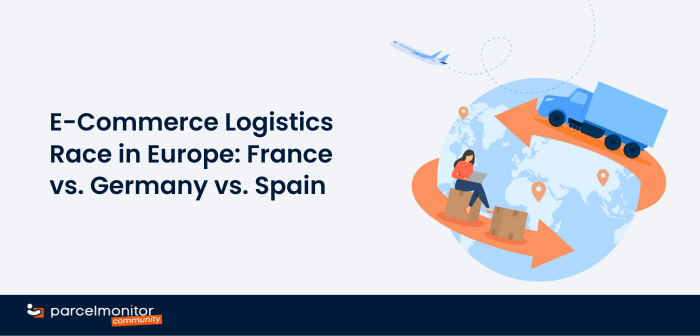Across Europe, the e-commerce sector has grown dramatically in recent years, a trend that is projected to continue in the near future. According to Eurostat, 68% of EU consumers aged 16 to 74 bought or ordered products or services online in the 12 months preceding the survey in 2022. With this in mind, this article presents an informed analysis of the e-commerce logistics scene in these three European powerhouses throughout the first half of 2023, France, Germany and Spain.
1) Parcel transit times improved in all three European countries
The transit time for parcel deliveries is critical in determining customer satisfaction and competitiveness in the race for e-commerce logistics dominance. Fortunately, France, Germany and Spain all showed a positive trend in parcel transit times in H1 2023, demonstrating their dedication to improving delivery efficiency and streamlining logistics networks.
For example, France saw notable progress, reducing the average transit time from 1.91 days in 2022 to 1.84 days in the first half of 2023. Germany, previously known for its impressive performance, honed its logistics operations even more, obtaining an enviable parcel transit time of 1.19 days in the same period. Likewise, Spain also made great gains over the same period, recording a transit time of 2.22 days, which was significantly lower than the 2.56 days reported the previous year. These achievements represent all three countries’ collaborative efforts to assure on-time and dependable delivery, putting them at the forefront of the extremely competitive e-commerce sector.
Among the three nations observed, Spain’s last-mile logistics industry has seen some of the most noteworthy developments in recent years. Internet sales are increasing at a 24% yearly rate on average, which is beneficial to the logistics operators in the nation. In addition, this country has a large number of logistics platforms. There are 152 logistics parks in Spain, totaling 58.7 million square meters, as well as five operating logistics activity zones in Algeciras, Bilbao, Barcelona, Motril and Seville.
2) Germany had the highest first-time delivery success rate in H1 2023
It is important to achieve a high first-attempt delivery success rate in this intensely competitive e-commerce logistics market. In this regard, Germany emerged as the clear leader in the first half of 2023, with the greatest first-attempt success percentage of 91.8%, followed by Spain and France with 88.6% and 87.1%, respectively.
Germany’s robust and well-developed logistics infrastructure is an important factor in the country’s outstanding delivery fulfillment performance. Its logistics network is noted for its efficiency, dependability and broad coverage, which contributes to its outperformance of France and Spain. With a solid infrastructure and a strong economy, it’s no wonder that some of the world’s largest logistics providers call Germany home, such as Dachser, DHL, UPS, Godbersen,. These companies provide a wide range of services, including last-mile delivery, enabling a smooth and dependable delivery process across the country.
3) France ranked first in terms of collection point usage, followed by Spain and Germany
Nowadays, parcel collection points are becoming increasingly popular across the world as customers are drawn to the flexibility, cost-effectiveness, and other benefits they provide. In H1 2023, France emerged as the leader in this aspect with roughly 14% of its parcels routed to collection points, outperforming Spain and Germany, which reported usage rates of 10.9% and 9.19%, respectively. France is also one of the top countries in Europe, if not the world when it comes to delivery at pick-up-and-go locations with 68% of purchasers favoring this delivery option.
One of the factors that contribute to France’s top position in collection point usage is the country’s strategic investment in building an extensive collection point network that is widely accessible in both urban and rural areas. Customers favor this accessibility, particularly in areas where doorstep deliveries are not as convenient.
Recently, Quadient, a major global parcel locker operator, announced that it is launching an open network of smart lockers in France, with installations already underway in major cities and the Paris region. With over 18,000 parcel locker units deployed globally, Quadient brings proven experience in the installation of open multi-carrier networks, particularly in the USA, Japan and the UK.
Furthermore, the French postal service provider La Poste has also improved the parcel collection point infrastructure in France by inaugurating a new generation of post offices as part of its €800m (US$858m) investment plan over five years. These efforts indicate that collection points in the country will become even more popular in the future years, reinforcing the attraction and ease of this delivery method for customers.
To read the complete article from Parcel Monitor, click here.


